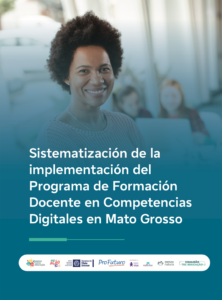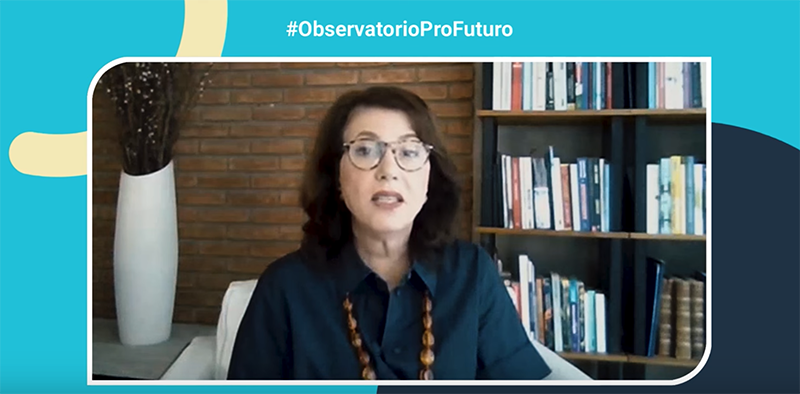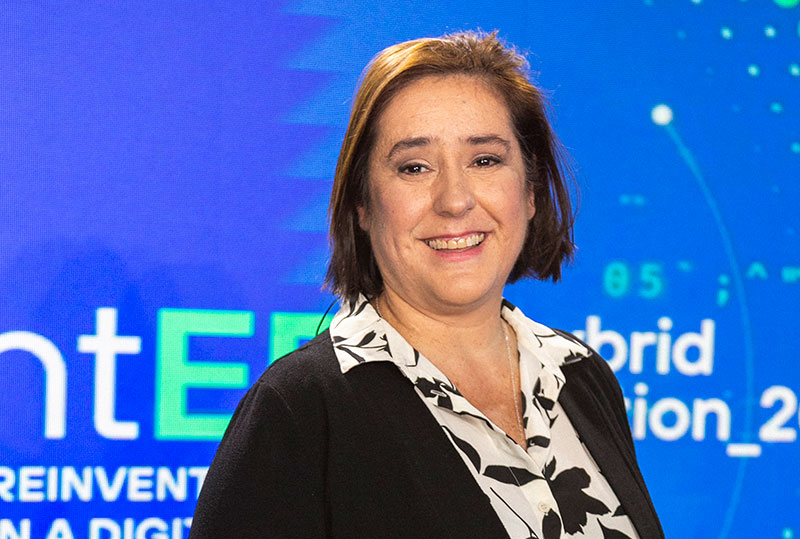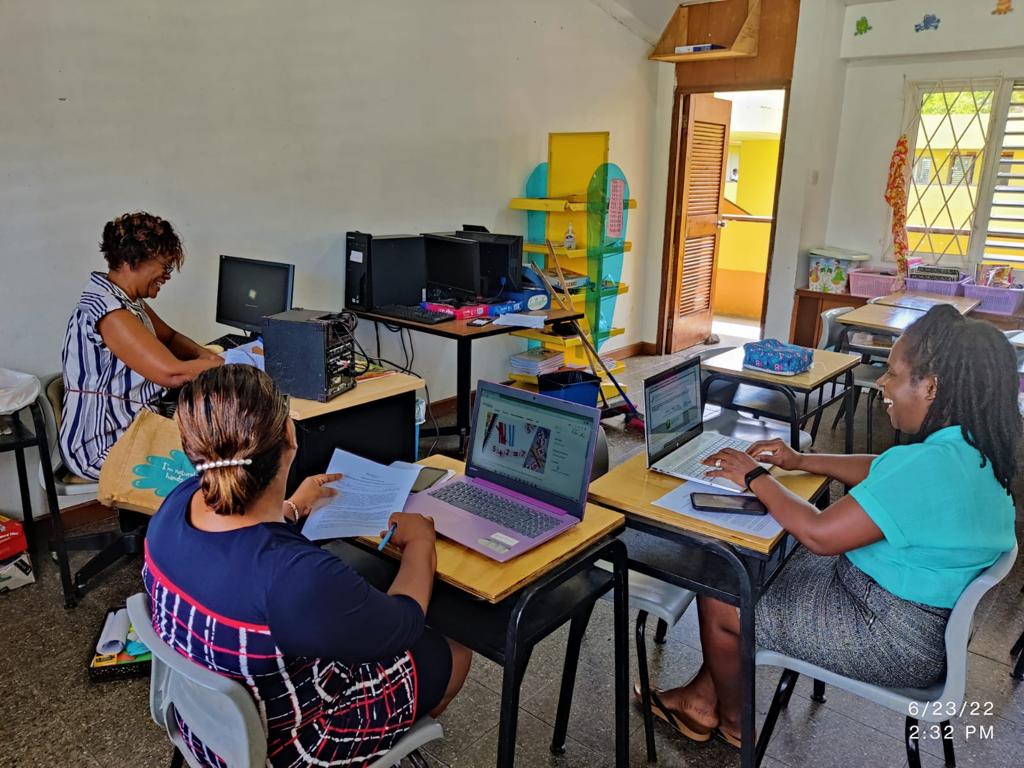As new technologies transform all sectors of our society and with it the labour landscape, the ability to navigate, understand, and apply digital tools becomes an essential skill. Students who master these skills are better prepared to face future challenges, adapt to new work environments, and contribute innovatively to society. Additionally, as we know, digital competencies also foster critical thinking, problem-solving, and creativity, skills that are highly valued in the contemporary world.
The implementation of these competencies puts us in front of the challenge of training teachers, who are essential to develop these skills in students. To address it, Fundação Telefônica Vivo and Instituto Natura allied in Brazil to develop the Teacher Training Program in Digital Competencies, aiming for teachers and managers to develop digital skills to incorporate them into their pedagogical practices.
The implementation of this program found a very good fit in the state of Mato Grosso, a region already very committed to the incorporation of digital technologies to improve education, and that already had a specific policy, “Educação 10 anos”, focused on the continuous training of teachers and their technological integration. These common interests materialised in an alliance, the “Pacto pela Digitalização”, established in 2022 between the state of Mato Grosso, Fundação Telefônica Vivo, and Instituto Natura to promote the development of digital competencies and innovative educational practices.
This article shares and analyses the results of the implementation of this alliance, which have been documented in the report “Systematization of the Implementation of the Teacher Training Program in Digital Competencies in Mato Grosso”.
The Teacher Training Program in Digital Competencies focuses on developing and implementing public policies that ensure teachers, administrators, and technicians have the necessary digital skills to improve student learning.
The Teacher Training Program in Digital Competencies
The Teacher Training Program in Digital Competencies focuses on developing and implementing public policies that ensure teachers, administrators, and technicians have the necessary digital skills to improve student learning. It includes several strategies and actions:
- Diagnostic evaluation: The first step of the implementation of the Program included understanding the starting point of the teachers in the state concerning the use and knowledge of technological resources. For this, the self-assessment tool of digital competencies (Guia EduTec, developed by the Brazilian Centre for Innovation in Education, CIEB) was used, which allows mapping the level of digital competencies of teachers.
- Training paths: Based on the results obtained in the self-assessment, teachers were guided to the training that best responded to their development needs. They were offered paths composed of various courses broken down into three areas: pedagogy, digital citizenship, and professional development, in a hybrid format and with varying workloads.
- Recognition policy: Finally, certification and award systems were implemented to motivate and recognise the continuous professional development of teachers.
The courses, which covered a wide range of topics such as the integration of technology in education, the development of socio-emotional skills, and the promotion of equity and inclusion in the classroom, were structured into various competency levels (levels 3, 4, and 5) and offered up to 66 hours of training, distributed in two semesters of 33 hours each. During 2023, 19,822 teachers participated in the courses, completing an average of 5.8 courses per teacher. The Escolas Conectadas platform facilitated access to these trainings, promoting broad participation and allowing continuous monitoring of participants’ progress.
Entre 2022 y 2023, el porcentaje de docentes clasificados en niveles superiores de conocimiento tecnológico aumentó significativamente del 25,4% al 52,6%.
Programme Results
Regarding the results, these have been notable, highlighting the importance of technological training for educators in an ever-evolving educational environment. As we will see, throughout its execution, the program has significantly improved the digital competencies of teachers and revealed key aspects of the effectiveness of the training and the strategies necessary for its success. Below, we present the main findings and achievements, providing a comprehensive view of the impact and lessons learned.
- Significant increase in competency levels: Between 2022 and 2023, the percentage of teachers classified at higher levels of technological knowledge increased significantly from 25.4% to 52.6%. This increase represents a positive variation of 27.2 percentage points, equivalent to a relative advance of 107%.
- Impact of the training: Teachers who participated in 10 to 25 hours of training showed an average progress of 1.1578 points in their level of technological appropriation compared to those who participated in less than 10 hours of training. However, a saturation point was identified where more hours of training do not necessarily translate into greater advances. This is because, after a certain point, learning efficiency can decrease if not accompanied by adequate complexity (as participants advance in their training, it is important that the content adjusts in complexity to maintain an appropriate level of challenge) and technological demand (if the technology taught is too basic or does not fit the practical needs of teachers, motivation and learning efficiency can be affected).
- It’s not just about the hours: The teacher training program in digital competencies implemented in Mato Grosso revealed that the effectiveness of the training does not depend solely on the number of hours invested but also on other key factors such as the degree of complexity of the content and the technological demand of the courses. For example, courses that present complex and highly relevant content tend to be more effective because they provide teachers with tools and knowledge that they can directly apply in their pedagogical practice.
- Better results at lower initial levels: The results showed that teachers with lower initial levels showed greater advances compared to those who already had a higher level of digital competency at the beginning.
- Participation and commitment: The high number of teachers who have participated in the training (19,746 teachers) demonstrates their commitment and enthusiasm for improving their digital skills and their interest in adapting to the new technological demands in the educational field.
Regarding the factors that have contributed to this success, we can highlight the following:
- Infrastructure and connectivity: The provision of more than 180,000 Chromebooks and 10,250 smart TVs, along with the improvement of internet service in schools, has been crucial to ensure that both students and teachers have access to the necessary tools.
- Continuous training and support: The offer of personalised and complementary training paths through the Escolas Conectadas platform has allowed teachers to access a wide variety of courses adapted to their needs and competency levels.
- Monitoring and evaluation: The use of tools such as the Guia EduTec for self-assessment of digital competencies has been fundamental to effectively map and direct the professional development of teachers. Through this process, the Mato Grosso Secretariat could direct training actions more precisely based on the initial diagnosis results of the teachers’ digital competencies.
- Recognition policy: The implementation of certification and award systems has incentivised teachers to actively participate and continue improving their digital skills. These systems include the issuance of certificates and recognitions, as well as scholarships for trainers and multipliers. Additionally, a Performance Evaluation System and an update of the Remuneration Policy have been integrated, which includes the possibility of receiving up to a 15th salary based on the completion of minimum hours of continuous training.
- Institutional support and collaboration between organisations: The success of the Teacher Training Program in Digital Competencies in Mato Grosso is largely due to institutional support and collaboration between various entities such as Fundação Telefônica Vivo, Instituto Natura, and the Mato Grosso Secretariat of Education (Seduc-MT), under the framework of the Educação 10 anos program and the Pacto pela Digitalização. This alliance has allowed for a comprehensive and sustainable implementation of the program. Coalizão Tec Educação, which brings together these and other organisations, has worked on key fronts such as infrastructure, technology management, and pedagogical training. Furthermore, the creation of an executive management committee and the implementation of continuous certification and evaluation systems have ensured the effectiveness and sustainability of the program.
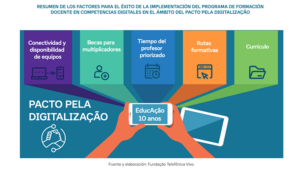
What’s Next?
After the initial success of the Teacher Training Program in Digital Competencies in Mato Grosso, it is essential to reflect on the next steps to consolidate and expand the achievements obtained. Below, we will see the lessons that emerge from this experience and that should guide the next steps of the program.
- Improvement in data collection: The analysis of the results of the Guia EduTec revealed, for example, that there is room to improve the collection of information associated with completing the self-assessment by teachers and school administrators. This approach would not only help mitigate the problems related to sample scarcity but also promote more committed and responsible participation. Increasing the number of reference observations would allow for broader and more accurate studies on the correlations between teacher performance and the training they undertake.
- Program expansion: This Program was conceived as a pilot and must be optimised and scaled to other locations in the coming years. As new experiences and contexts are integrated into the analysis, it will become more robust and complete. Therefore, the inclusion of other regions in the Program is an essential next step to improve the evaluation of results.
- Constant monitoring: The true success of the Program will depend on frequent monitoring and continuous actions that ensure its long-term sustainability. Support for curriculum review and the adequacy of support materials for continuous network training are examples of necessary actions. It is expected that the success of the experience in Mato Grosso will be strengthened in the coming years.
To access the full report, click here.
References
“Systematization of the Implementation of the Teacher Training Program in Digital Competencies in Mato Grosso.” Coalizão Tec Educação. Available at Fundação Telefônica Vivo.




